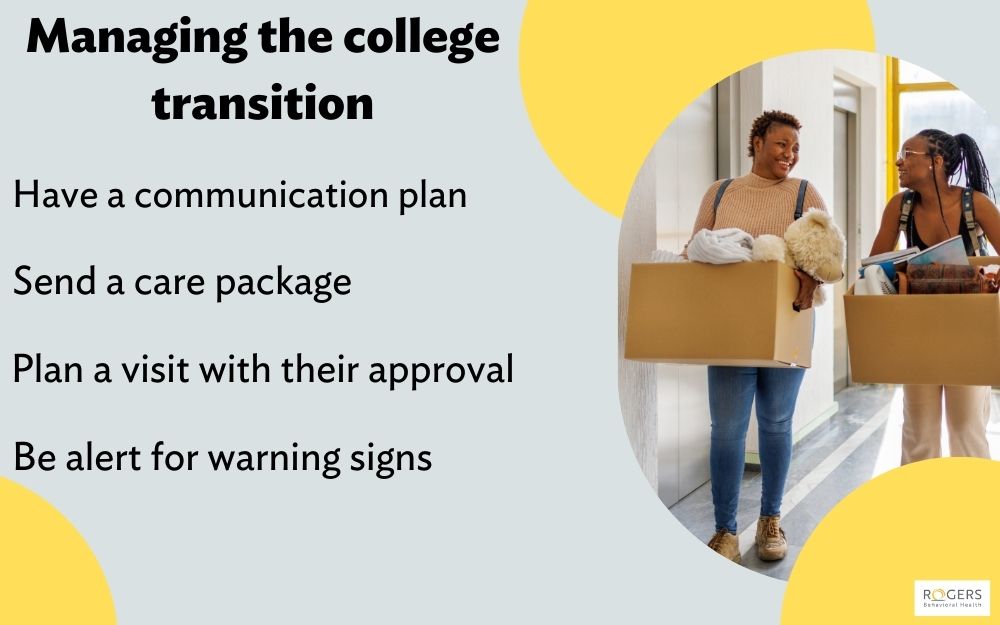Tips for transitioning your child to college
Posted on 08/05/24 11:11:am
Share this article:
By Zach Stenzel, therapist at Rogers in Nashville
What might kids and parents feel before the transition from high school to college?
For parents, feelings of worry, even dread, are very common. Worry can often stem from lack of control and proximity to their child. The feeling of dread - apprehension or even great fear - can occur if anxiety begins to take over. Parents can be concerned that their child may not be able to handle navigating their future or independence. They can be so used to their set routines and schedules that they’ve set up for their children that it’s not always easy to trust that their child can independently do it.
How can students mentally prepare themselves?
Students can prepare themselves mentally by planning ahead:
- Gather information by talking with other people.
- Ask others about their college transitions and what they wished they knew beforehand.
- Figure out what coping and grounding skills work best for you. Examples are deep breathing, a mindful walk, guided meditations, and mindfulness 5,4,3,2,1 (5 things you can see, 4 things you can touch, 3 things you can hear, 2 things you can smell, and 1 thing you can taste).
I often tell my patients that coping skills are a lot like shooting a free throw in basketball. Do we want our first time to be when we’re down by one and the crowd is watching? Or do we want it to be in practice with our teammates? Of course, we want our first time to be in a safe environment without the added pressure. Practicing coping skills is the same way. Practice them when we’re not feeling anxious, so that they’re easier to recall and there’s less pressure to remember all the details when we’re feeling pressure and anxiety. Going into the transition to college with a toolbelt full of favorite coping skills and grounding techniques can be a game changer.
Leaning on relationships is also important, and that can look different for everyone. Some will be entering a completely new space with all new people, while others may be traveling with friends to their new school. Leaning on existing relationships that are important, whether in person or long distance, will help a person stay grounded and provide a strong source of support. As students enter their new environments, they should remember what attracted them to their current friendships and what’s made those relationships strong. Look for those qualities in the people that they will meet.
What challenges might students face while adjusting to college and life away from home?
There will absolutely be challenges as students make the adjustment to life in college. One is the major switch of being more or less under a parent’s control to having freedom. For those who grew up in a controlling household and didn’t have much freedom or responsibility throughout high school, the transition to less accountability may come as a shock. They won’t have an authority figure reminding them to eat their vegetables or do their homework.
Setting up healthy routines and habits before leaving is important and will help students with making the adjustment. This may look like:
- Exercising and stretching regularly
- Making healthy food choices
- Creating sleep hygiene routines. Sleep hygiene is the process of putting screens away one hour before bed to let our brains wind down, engaging in soothing activities, like reading, and using the bed only for sleeping, so the brain associates it with sleep.
- Having regular mealtimes
- Making a designated space to complete homework or studying
- Taking regular breaks
Another challenge is adjusting to new people and new places. Dorm life can be very different than home life, and sharing a room with a stranger can be unsettling. Clear communication, relationship building, and boundary setting are all important for managing the roommate relationship. Living in a new place provides its own set of challenges, including finding new restaurants, grocery stores, or fun activities, like sporting events or concerts. Make sure to learn about where the closest utilities are to you, like gas stations, car repair shops, and grocery stores. Study a map of the new surroundings. Getting around in a new place may be tough, but knowing where you’re going is worth it.
What tips do you have for parents/caregivers to help a child transition?
For parents, their job is to foster and teach their children how to be functioning adults. An important part of doing that is giving them opportunities to prove they can be responsible and independent. As they progress through high school, give them opportunities to show they can be responsible, in addition to allowing them to fail. In the safe environment of home, parents can teach young adults lessons if they make mistakes. Ideally, this will lead to the transition from senior year of high school to freshman year of college feel much less drastic, as they are used to a certain level of independence and freedom already, having proved that they can handle it.
Another important part of helping children transition to college is communication. If parents make assumptions about what they do or do not know, that leads to harmful gaps that may hinder their success. I recommend parents talk to their child about what their plans are, what areas they need help or support, and ways they want to shape communication moving forward. Remember, communication is a two-way street. This is not only on you as a parent.
As everyone is preparing for the transition, parents may find themselves wanting to fix any little issue, address any problem that arises, or even preemptively solve problems that have not come up yet. This is a cycle known as accommodations, where parents are taking away or removing the child from an anxious situation, or not allowing them to push through it themselves. This leads to the child learning that either the situation is dangerous, and they shouldn’t work through it, or that their parents will be there to rescue them from any anxiety. Part of growing up is learning to push through adversity and problems. If parents don’t allow their children to experience moments in which they could fail, they will not truly succeed.
How can parents/caregivers offer ongoing support and when should they be concerned?
Communication is critical!
Parents want to know how their child is doing during their transition from high school to college. Since it’s a very busy time for the student, setting up appropriate expectations of communication is key. Maybe the student will have time for a weekly phone call, or maybe it will be a few texts during the weekend. Understand that they could be overwhelmed, and that constant communication may be difficult. If parents want to show support, sending a care package can go a long way. It doesn’t have to be anything extravagant. College students would love some snacks or goodies that remind them of home. If the child is onboard, maybe pick a weekend to visit them and see how things are going. Treat them to a nice meal or have them show you around their new favorite spots. Make sure that this is not a surprise trip, as they may have plans or feel overwhelmed by suddenly having to play host.
Parents are going to worry about their child. It comes with the territory.
Warning signs look different for each individual, but some common ones may include:
- Sparse communication
- Increased isolation
- Lack of attendance in classes
- Engagement in unsafe behaviors.
Talk to your child ahead of their transition about how they want to be supported if things start to go poorly. Planning ahead of time will allow parents to feel confident in their support, and the child will know that they have a safety net to fall back on.
You can hear more from Zach in our Rise Above podcast.
How Rogers can help
Rogers offers PHP/IOP around the country, in addition to inpatient and residential in Wisconsin. Call 800-767-4411 for a free, confidential screening.



